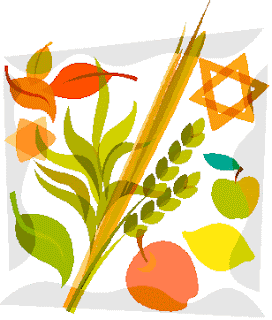Rosh Hashanah:
- Jewish New Year, the first high holidays which is the Day of Awe celebrated 10 days before Yom Kippur
- Falls once a year during the month of Tishrei (September)
- They observe the sounding of the shofar, which is the rams horn trumpet, the shofar is not blown if the holiday falls on Shabbat
- Lasts 1-2 days
- One of the main reasons the apple is used is because of its sweetness. Coupled with the added sweetness if the honey, it is symbolic of the ultra-sweet year they hope God will grant them.
Sukkot:
- The Festival of Sukkot begins on Tishri 15, the fifth day after Yom Kippur. It is quite a drastic transition, from one of the most solemn holidays in our year to one of the most joyous.
- This festival is sometimes referred to as Zeman Simkhateinu, the Season of our Rejoicing. Sukkot lasts for seven days.
- Sukkot has a dual significance: historical and agricultural. The holiday commemorates the forty-year period during which the children of Israel were wandering in the desert, living in temporary shelters. Sukkot is also a harvest festival
Yom Kippur:
- Yom Kippur means ‘Day of atonement’. It is a day of trying to make up for your sins
- It is the most Holy day in the Jewish Calender
- Anyone who is over the age of bar/bat mitzvah is expected to fast all day
Hanukkah:
- Hanukkah is a celebration of Jewish people gaining freedom. It is the most well known Jewish festival, but not the most significant as it is not written in the Torah.
- It is celebrated for eight days and nights.
- It begins on the 25th of the Jewish month of Kislev (late November/December)
- In Hebrew the word “Hanukkah” means “dedication.”
- Some of the Hanukkah traditions include: lighting the hanukkiyah, spinning the dreidel and eating fried foods.
- Jews celebrate Hanukkah in replace of Christmas because they do not believe the Jesus is the Messiah.
- Hanukkah means “Festival of Lights.”
Passover:
- Passover begins on the 15th day of the Jewish month of Nissan. It is the first of the three major festivals with both historical and agricultural significance. Agriculturally, it represents the beginning of the harvest season in Israel, but little attention is paid to this aspect of the holiday.
- The primary significance of Passover is to commemorate the story of Exodus, in which ancient Israelites were freed from slavery in Egypt.
Tu B’Shevat:
- Tu B'Shevat is a minor Jewish holiday known for the New Year for trees. Tu B’Shevat It occurs on the 15th day of the Hebrew month.
- This holiday lasts from sunset of the first day through up until sunset of the next day.
Shavout:
- Shavuot, the Festival of Weeks.
- It is also known as Hag Matan Torateinu (the Festival of the Giving of Our Torah).
- Shavuot is not tied to a particular calendar date, but to a counting of 7 weeks from Passover.
- Work is not allowed on Shavuot.
- They stay up the entire first night of Shavuot and study Torah, and then pray as early as possible in the morning.
Shabbat:
- Shabbat is the day of rest
- “By the seventh day God had finished the work he had been doing; so on the seventh day he rested from all his work. Then God blessed the seventh day and made it holy, because on it he rested from all the work of creating that He had done.”
- Exodus tells Jews to “keep the Sabbath day holy
- Shabbat begins on sundown Friday and ends on sundown the next day
- Religious services are held on Friday night and Saturday morning. The family usually attends these
- At night, they study the torah or talk before going to bed
Omer Period:
- Omer means a measure of grain that was once offered at the temple of Jerusalem
- They give this to God as a way of saying thanks for the good harvest
- The period of Omer is between Passover and the festival of Shavuot
- It lasts for seven weeks
- It is a period of mourning because during this period many years ago a rabbi and many of his students died of the plague









